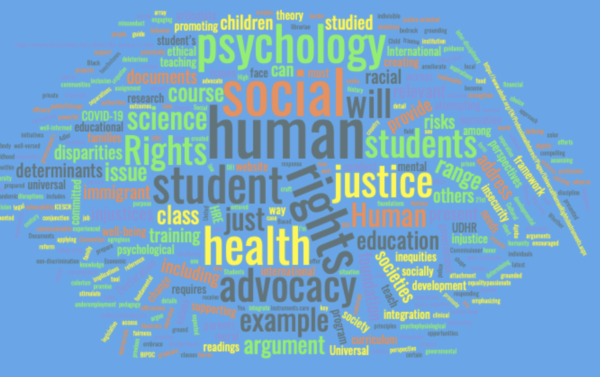/By Neal Rubin/ USA
Whether before, during or in the aftermath of the COVID-19 pandemic, within and across societies, humanity has and will face a range of compelling human needs as a consequence of injustice. In the 21st century, psychology as a discipline and as a profession holds the promise of responding to these needs with a view to promoting more just societies. But what will guide us in determining what is just and in creating more socially just societies?
Human rights provide such a foundation for guidance in assessing the moral and ethical perspectives on defining what is socially just. Documents such as the Universal Declaration of Human Rights (UDHR) and the documents comprising the International Bill of Human Rights articulate core values that provide a universal normative legal framework for grounding advocacy for social justice initiatives. These documents embrace equality, fairness, non-discrimination and human dignity which are touchstones for advocacy to promote our aspirations for a more just world.
In this way human rights education (HRE) integrated with psychological science may become a powerful tool for the realization of social justice. In the discussion that follows, I provide one example to illustrate this perspective on pedagogy for the education and training of psychologists.
Integrating human rights in a social justice-oriented psychology class
I have the honor of teaching and training graduate students in clinical psychology in a program committed to promoting social justice. At Adler University in Chicago, students are well-versed in the values of diversity, equity, and inclusion (DEI) and the institution is committed to engaging disparities in communities and individuals who are Black, indigenous and people of color (BIPOC). I am teaching a course on the social determinants of mental health, emphasizing health disparities and racial inequities in the current COVID-19 era.
Our students are passionate about addressing the injustices they see in society and in our global society. The course requires students to envision advocacy on their issue of choice by creating a program or policy that they will present to the appropriate governmental body or private foundation for legislative and/or financial support. Their argument must be grounded in the latest research, including the efficacy of previous efforts to address the injustice, the relevant social determinants and the documented racial inequities. They are encouraged to take an inter-disciplinary approach to their issue including public health and an array of social sciences.
In this project students address a wide range of local, national and international issues. From access to health care to food insecurity, from educational opportunities to underemployment, and from adverse childhood experiences to job insecurity, research on these social determinants is presented in the curriculum to stimulate their perspectives and arguments for social change. The injustices they address range in their class projects vary widely including, for example, racial disparities, immigration, prison reform, colorism, and police misconduct among others.
I’m certain others teach similar classes. What I am attempting to integrate into the training and education of students in this class is familiarity with the human rights foundations for each student’s social justice issue. Students are expected to detail the relevant human rights principles and documents for their argument for social change. The human rights education (HRE) they receive to prepare for this assignment includes readings on the history of human rights, details of the development of key human rights instruments, readings on the integration of psychology and human rights, a website of supporting materials for the course created by our reference librarian and of course, the website of the United Nations Office of the High Commissioner for Human Rights (https://www.ohchr.org/EN/ProfessionalInterest/Pages/UniversalHumanRightsInstruments.aspx.)
So, for example, a student who seeks to advocate for the injustices experienced by immigrant children and families at the southern border of the US who have been separated by government authorities when they entered the country will craft a response to this egregious situation. Based on their curriculum, the student will be well prepared to present the deleterious short- and long-term impacts of these separations. Having studied health psychology, the student can articulate the risks for the psychophysiological sequelae of such disruptions; having studied developmental psychology, the student can present the implications of attachment theory; having studied trauma theory, the student can argue for the vulnerability of post-traumatic risks to the neuro-cognitive development and well-being of the child, their parents and family. The student will be well-informed in applying the science of psychology (https://www.srcd.org/briefs-fact-sheets/the-science-is-clear).
But what is missing in such an analysis that would strengthen the student’s argument and advocacy for this or any other social justice issue?
My answer, and what I teach in the class, is that the integration of human rights with the science of psychology provides the bedrock across the range of social justice issues. Yes, the health and mental health outcomes of such unconscionable behavior by government officials requires knowledge of our science, but the conduct the student is attempting to correct violates fundamental human rights. And it is because of these violations, that (in this example) these immigrant children and their families face such risks to their health and well-being. For the purpose of this educational experience, then, the student must ground their argument and shape their advocacy by detailing, for example, the relevant articles in the Universal Declaration of Human Rights (UDHR), in the Convention on the Rights of the Child (CRC), and the International Covenant of Economic, Social and Cultural Rights (ICESCR) among others. In this way their advocacy for social justice is strengthened by international law.
It is because human rights are universal, indivisible and inalienable, that they form a normative foundation for ethical and moral conduct. In the case of the government’s separation of immigrant children from their parents, a human rights framework in conjunction with supporting psychological science creates the most potentially efficacious avenue for advocacy our field has to offer to ameliorate such horror.

